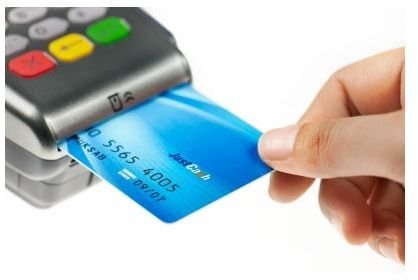Who Is At Risk for Credit Card Skimming?
`` Credit Card Skimming
Credit card fraud is a major issue that affects everyone. Walk into just about any office supply store or other major big box outlet and at least one section is dedicated to shredders. Big ones, small ones, and ones that cross cut. Privacy experts all agree that shredding personal documents and old credit cards helps enhance personal information security around the house and office. The result is that the criminal has changed the way he gathers your data. Dumpster diving is no longer the only method to get your credit card data.
Skimmers have added another tool to the criminal’s bag of tricks. A skimmer is a small device similar to the card readers seen at cash registers in every store. However, instead of connecting to a bank to pay for a purchase, the sole purpose of the skimmer is to capture and save the information on a card’s magnetic strip. The information is later transferred to a portable computer and compiled with other numbers to be sold to others who can make use of it. Other thieves have the ability to create new magnetic strips to apply to card stock and make use of the information immediately for shopping or buying gas.
Who is at risk for credit card skimming? Virtually everyone who uses credit cards or debit cards on a daily basis. Skimmers are found on ATMs, retail kiosks, and movie rental boxes, and many are simply carried by the employees to whom you hand your card.
Who is Skimming You?
Often it’s disgruntled employees of retail shops or restaurants. On August 5, 2011, a waitress in Port Richey, Florida, was arrested for skimming the credit card data from at least nine customers. The data was used to create new cards used to purchase expensive items. According to the 2011 Verizon Breach Report this sort of misuse constituted over 17 percent of the breaches reported.
Other cases involve installing a skimmer onto an ATM or kiosk. Everytime a victim uses his or her card to withdraw cash or pay for an item, the device records and stores the card data and pin. Later, the criminal returns to the ATM or kiosk and removes the skimmer or downloads the information to use or sell. On August 8, 2011, such a device was found on a cash machine at the popular Saturday Market in Portland, Oregon. An unknown number of people used the ATM and the police recommended that Saturday Market shoppers check their bank statements.
Avoid Getting Skimmed
Whenever possible do not let your card out of your sight to reduce the risk of it being skimmed. Take the card to a cashier at the restaurant. Frequent places that bring the card reader to you. Follow the cashier or clerk if they indicate they need to move to another register or counter to process a transaction. Be aware of any extra devices attached to the face of an ATM or kiosk.
Gas pumps are another location where skimmers are often found. Skimmers are designed to look like part of the machine but made to be easily removed. Give the reader a little tug to see if it comes loose.
Thieves sometimes also place a small camera pointed at the keypad to capture the pin information for cards they manage to skim. Cover or hide the keypad as you enter your pin. Refuse any attempts by someone to help you; this may be a skimmer attempting to memorize your pin number. Call the bank or ATM owner if there is a problem or your card gets stuck.
Check your bank and credit card statements every month for irregular activity or charges. Match receipts to charges much like you would reconcile a checkbook.
What to Do After Getting Skimmed
Call the police. Having a police report starts the process of cleaning up the mess. Provide the report to your bank and/or credit card companies when disputing fraudulent charges. Federal law limits your liability to $50, but many banks and credit card companies waive even this amount. Debit cards on the other hand must be even more carefully watched. After a defined period of time you may be on the hook for the entire amount of the fraudulent charges.
Place a security freeze on your credit at the major credit bureaus, Transunion, Equifax and Experian. This prevents the thief from opening any new accounts in your name. It does add a layer of inconvenience if you want to open new lines of credit, but having this protection serves as a future deterrent to thieves with your information.
References
- Fightfraug.nv.gov, “ATM Scams”, http://fightfraud.nv.gov/scams/2008-07-22ATM.htm
- Creditcard.com, “Skimming 101: How to spot it, avoid it, deal with it”, http://www.creditcards.com/credit-card-news/credit-card-skimming-scam-1282.php
- Image Credit: worradmu / FreeDigitalPhotos.net
- KGW.com, “ATM skimmer at Portland Saturday Market”, Jeff Thompson, http://www.kgw.com/home/ATM-skimmer-found-at-Saturday-Market-127073353.html
- Verizonbusiness.com, “2011 Data Breach Investigations Report”, http://www.verizonbusiness.com/resources/reports/rp_data-breach-investigations-report-2011_en_xg.pdf
- Techrepublic.com: “Five tips to avoid debit/credit card skimming”: Michael Kassner: http://www.techrepublic.com/blog/five-tips/five-tips-to-avoid-debitcredit-card-skimming/299
- WTSP.com, “Waitress rips off customers with credit card skimmer”, Laura Kadecha, http://newportrichey.wtsp.com/news/crime/73464-waitress-rips-customers-credit-card-skimmer
- Networkworld.com, “Credit Card Skimming: How thieves can steal your card info without you knowing it”, Jamey Heary, http://www.networkworld.com/community/node/33210?page=0%2C0
